I'm No One. Just a fan of Intertwined Destinies who resonate with each other, SNK/AoT, Feysand, TFOTA, Fourth Wing and ASOIAF. Ben Solo deserved better. Icon belongs to the artist heyvossie. That's all.
Last active 3 hours ago
Don't wanna be here? Send us removal request.
Text

Violent little thing 🖤
This didn't happen in the book but I would sell my soul for a book rec with a scene like that.
If you post Onyx Storm spoilers in the comments I will block you.
If you'd like to support my work, check out my Patre0n for early access, exclusive spicy art, work-in-progress of future paintings, printable files and more! 💕🗡️
Inspired by Fourth Wing by Rebecca Yarros
181 notes
·
View notes
Text
Hilarious that all the venin think they’ve won with Xaden on their side but actually that man’s heart still well and truly lies with his wife and you’re actually all fucked if you harm a hair on her head
119 notes
·
View notes
Text
I love the comparisons and contrasts between Everlark and Snowbaird (edit: I wrote a meta here discussing some of what I see there and Rachel has drawn the comparison too) because there is no “safe” purely “wholesome” love. It doesn’t exist.
I genuinely hate that fandom thinks there’s such a thing as a pure ship. Or that we can or should take art and cut it into neat little pieces, use stories to “teach girls” (where girls are presumed to be the most ignorant and worthless of creatures, incapable of the full experience of what it means to be human, but also the only ones responsible for anything bad that happens, creatures so responsible that all tragedies that befall them are their own fault, their deepest shame) how to make love safe. It’s a lie. Loving is about people, and people are never pure. Everything good we give each other is hard won with courage in the face of fear.
It is inherently dangerous because humans are. And if you’re lucky, you give yourself to someone who meets that trust and courage with their own. And if you’re not lucky, it hurts. And there’s no way to control it. There’s no way to be smart enough or pure enough or notice the right “red flags” (irl abusers are good at hiding and perfectly lovely people can become ill or addicted or just *change* on you). You can be lucky for a time and someone can still change.
Because you cannot control someone else, just love them.
And–here is the great part–it was that very lack of control that drove Coriolanus to throw love away! He was so afraid of what an inherently terrifying thing it is, how it is giving yourself away without guarantees, that he brought that fear down on them. He became the traitor he was so terrified that Lucy Gray might be. He destroyed something infinitely precious because he couldn’t live with what a sublime wonder and terror it is to give yourself away with open hands. Love is never pure. It is so much better than that. It is…
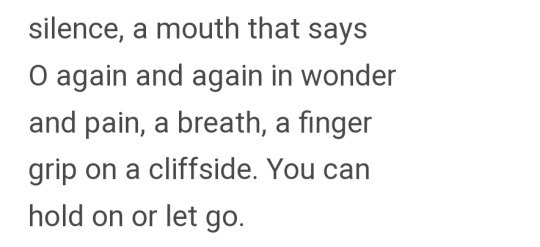
I write all kinds of ships and like all kinds of love stories and see no contradiction because even the happiest ones are that too. I am endlessly frustrated by the way Gothic romance and tragic romance and other romances that explore the terror and darker side of that are pathologized because it makes the more joyful, happy endings dishonest. Love is risk, touching the sublime, allowing yourself to be remade.
Every joy we find in life–every single one, not just in romance, but anywhere–is like making love in the lap of death. In the midst of life we are in death; in the midst of death we are in life. The only thing worse than the fear of giving yourself away (in all the ways we can seek intimacy, not only romance) is the truest death, the death of never opening yourself up to begin with, never letting yourself be changed and moved and remade by another. And if we need an object lesson in that, here we’ve got Coriolanus Snow!
He’s not an object lesson in “bad boyfriends.” Lucy Gray made good choices from her pov! (I’m writing a separate meta on this). Nothing that happened was her fault! She is not an object lesson, she’s a brave, loving girl who experienced a tragedy. She was betrayed. She’s a character of the kind of folk ballads Collins was drawing on, which are actually more honest about people and more compassionate toward women who experience tragedy and loss than a rigidly US-centric, individualist, inherently victim blaming, just world fallacy view of control and “teaching girls good lessons.” You can drain all the pleasure and joy out of life in the effort to control things and keep someone from being able to hurt you and still not really be safe, just be dead inside - like Coriolanus did.
The only way to truly possess someone is to destroy them and then you don’t actually possess them at all! They’re gone. The person you wanted to keep you’ve driven away. And the only way to truly be safe and in control is to kill your own heart. So what are you even protecting?
There is no shame in being Lucy Gray. The shame is in letting fear and the need for control own us like Coriolanus.
As someone who feels torn often in fandom because I ship both love stories that get categorized as “wholesome” and “problematic,” the fact that Collins wrote both one of my favorite ships ever that gets categorized (and, I think, often massively simplified) into “wholesome” AND another “problematic” one that IMO is a gorgeous object lesson in why the whole idea of this binary is bullshit–and why love stories can and should explore the terror of being alive and living as well as the joy and genres like Gothic and tragedy are a beautiful part of the tapestry of narratives exploring love and living as a human in fiction–and we should very much NOT be Coriolanus?
I love her. I want to kiss her hand.
125 notes
·
View notes
Text

I will never pass up the opportunity to get a stunning portrait by @tomandosal , she has such a magnificent way of pulling characters together!
I’m absolutely in love with this version of Violet Sorrengail 🔥
I hope everyone is going to have a lovely weekend! I’m spending it relaxing in catching up on a lot of really exciting projects, messages and mayhap some overlays releasing👀 Stay happy people! 🥰
Do not repost.
949 notes
·
View notes
Text







Vincent Benítez and Thomas Lawrence being 🌸 🎀 🫧💗✨ feminist icons 🌸 🎀 🫧💗✨ in CONCLAVE (2024)
2K notes
·
View notes
Text
you’re telling her the horrific loss of her sister ruined your chances of dating her I am planting her primroses to memorialize her sister with no expectations of a relationship we are NOT the same
3K notes
·
View notes
Text
Sunrise on the Reaping: A Love Story
I finally read Sunrise on the Reaping. I'm a fan.
It's funny because I keep seeing takes that Collins wants to write a story about propaganda and revolutions and tyranny and how tyranny uses love stories as propaganda to distract from the revolution. "She keeps writing it because the masses still don't get it!" Except, this take could not be more wrong.
The love stories are the revolution, baby.

Love Can't Be Killed
Love can't be killed. After all, Haymitch notes in his resolution that he's realized:
The Capitol can never take Lenore Dove from me again. They never really did in the first place.
The resiliency of love is symbolized through Haymitch's improbably survival through the Games. He enters convinced that he won't survive. Never really considers surviving or winning, and Snow confirms that he plans for Haymitch to die. However, Snow's flaw from The Ballad of Songbirds and Snakes remains: he believes he can control other people. And to an extent, sure, fair.
But he can't fully control them, not even when they're trapped in an arena with no way out and every attempt to escape thwarted.
(Side note: I've seen some people saying that it's a retcon that Katniss's act with the berries is seen as more rebellious than Haymitch's, because Haymitch is trying to rebel directly but Katniss is not. I actually disagree. The point is that Haymitch outsmarted the Gamemakers by using their own weapons against a fellow tribute. Katniss outsmarted the Gamemakers against themselves, forcing them to be the ones to break their own rules.)
Against the odds, Haymitch still survives. So then Snow decides to punish him by taking out everyone he's ever loved--his mother. Sid. Lenore Dove. And the cruelty is that Haymitch then becomes like Snow, or that's the intent anyways. Pushing away his loved ones, his friends, out of fear that they'll come for them next. Isolating himself for paranoia to consume.
But it doesn't work, because Haymitch still maintains his love for Lenore Dove. Yes, the fear and alcohol dull it for awhile. But it never fully dies. The very friends he pushed away have a daughter whose life he saves, and who then does what he tried and failed to do.
Love wins in these Games. Beetee's love for Ampert can't save his life, but they honor his legacy decades later. Wiress and Mags get tortured, but they too play a role in taking the Games down. The Newcomers' love and loyalty for each other gives comfort to those facing their imminent deaths.
Snow really should have learned that love can't so easily be killed. It's pesky and rascally, like Haymitch. It's resilient.
Hell, Snow is still hung up on Lucy Gray and focused on destroying love because love reminds him of weakness, the weakness he ended TBOSAS by vowing to cut out of his life. Hence, marrying Livia. Destroying all recordings of the 10th Hunger Games... except for one, because he still can't fully let go. I mean, he literally sees Lenore Dove as Lucy Gray 2.0 and bitterly reminisces with Haymitch about her.
“Bet I know a thing or two about your dove.” “Like what?” “Like she’s delightful to look at, swishes around in bright colors, and sings like a mockingjay. You love her. And oh, how she seems to love you. Except sometimes you wonder, because her plans don’t include you at all.”
Except, he's wrong about who Lenore Dove is.
Lenore Dove is Love

A common criticism I've seen of the novel is that Lenore Dove is more of an idea than a character. I don't necessarily disagree with this. However, I think her idea is more meant to be the embodiment of love than a manic pixie dream girl. I mean her name starts with L and ends with -ove. It's not subtle.
(Yes, her name is also an allusion to Edgar Allen Poe's poem "The Raven" and the lost Lenore, and also to the color of dove, which is also a bird that is the opposite of the raven symbolically--standing for peace as opposed to death. This ultimately symbolizes the end of Sunrise on the Reaping, where love first dies but then rises to create a lasting peace.)
From a character perspective, she more mimics Sejanus than Lucy Gray Baird. Lucy Gray was wise in many respects; Lenore Dove is distinctly not. In fact, she's reckless to the point of endangering her loved ones, even if she's morally in the right for trying to comfort a woman who lost her son, morally right to protest the Hunger Games, etc. She still endangers her uncles, her friends, and Haymitch.
However, I'm not saying it was Lenore Dove's fault Haymitch got reaped. Even if she did set off said events, a major point is that the Hunger Games seems inevitable. They would have had their way regardless, even if it didn't affect her and Haymitch's life and loved ones directly. Yet, there is still point and purpose to protesting. Her lack of wisdom wound up hurting her just like Sejanus's did, but that doesn't mean they deserved what happened--or that what they did didn't matter.
Love Works Miracles

Again, forcing Haymitch to push away Asterid, Burdock, Blair, and all his friends works for a time, but not forever. Because Burdock comes back into Haymitch's life via Katniss, a child created through love with Asterid--love Haymitch himself says in the book is never gonna happen.
... he’s got about as much chance with her as a mockingjay with a swan. Town girls don’t marry Seam boys, not unless something really goes haywire.
But Asterid and Burdock's love did happen, and that love Haymitch thought was impossible, combined with Katniss and Peeta's love story, between a town boy and a Seam girl, broke the arena and caused Panem's evil structure to go haywire.
Katniss and Peeta's Romeo and Juliet moment with the berries may not have been the common assumption of "oh I just can't live without you, my other half!" melodrama, but it was a decision two scared kids who grew up experiencing violence made, a decision to choose love over violence. (Which is actually pretty in the spirit of Romeo and Juliet.)
The Dream of a Ridiculous Man
The story opens with quotes from philosopher David Hume, who muses on why humans obey implicitly when they don't have to. Like, honestly, if you think about it, for example, why does money have worth? Why do scraps of paper have worth? Why can't the entire world decide tomorrow that it doesn't, that we should all just give each other what we need and want? Why can't we? Why do we tolerate societal systems that oppress us and lead to cycles of bloodshed and oppression?
Anyways, this idea is one of the main themes of a Dostoyevsky short story called "The Dream of a Ridiculous Man," which is one of my favorites. The main character comes to a similar conclusion as Collins seems to:
It is an old truth, but this is what is new: I cannot go far wrong. For I have seen the truth; I have seen and I know that people can be beautiful and happy without losing the power of living on earth. I will not and cannot believe that evil is the normal condition of mankind... Suppose that this paradise will never come to pass (that I understand), yet I shall go on preaching it. And yet how simple it is: in one day, in one hour everything could be arranged at once! The chief thing is to love others like yourself, that's the chief thing, and that's everything; nothing else is wanted--you will find out at once how to arrange it all.
Even if paradise and peace on earth never comes, it could. If every single person just decided to choose to love each other, to forgive everything, to move on, it could. And we each have the ability to choose love, and even if others do not choose it, at some point revolution will come.
Lenore Dove's dream of a sunrise without the reaping seemed ridiculous to Haymitch, especially when he lost everyone. But as long as he was alive, the ability to choose love remained there for him, and he chose it and fulfilled her dream. Ampert's dream to destroy the arena was fulfilled. Maysilee's to paint her own poster, when her mockingjay pin became the symbol of the rebellion. Wyatt's dream to protect younger kids, because there is no more Hunger Games.
Love seems ridiculous. It's also the only thing we have. And in these times, especially, that's a powerful message.
Anyways because the masses still don't seem to get that the love stories--romantic, platonic, and familial--are integral to and not extraneous of the revolution, both in the Hunger Games universe and frankly out of it as well, I have hope that Collins will yet again be forced to pick up her pen and educate us all with a third prequel with an explicit love story. Likely Finnick and Annie's. I'm not joking either; I think there's a very good chance of this as some key aspects of TBOSAS and SOTR strongly hint at it.
107 notes
·
View notes
Text
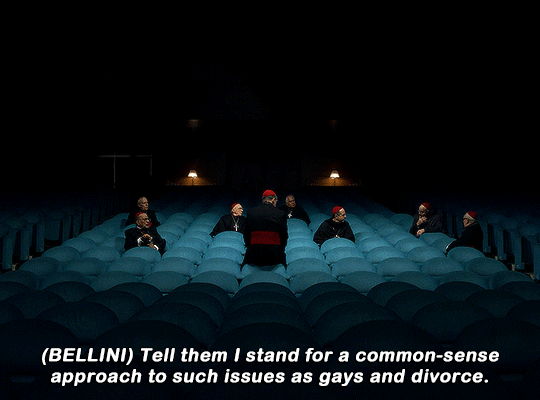
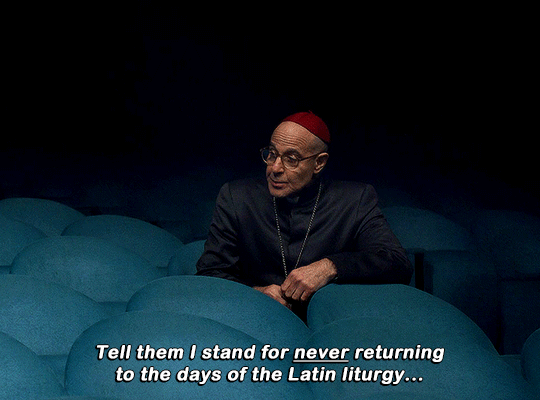


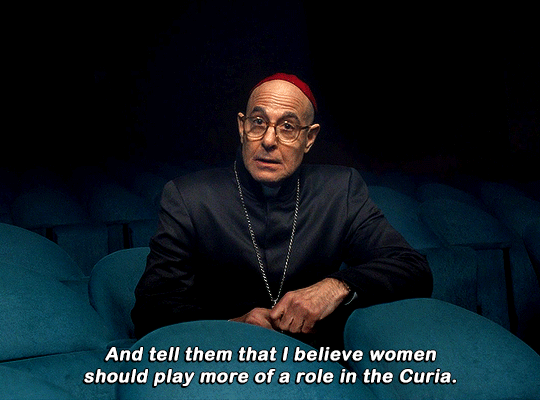
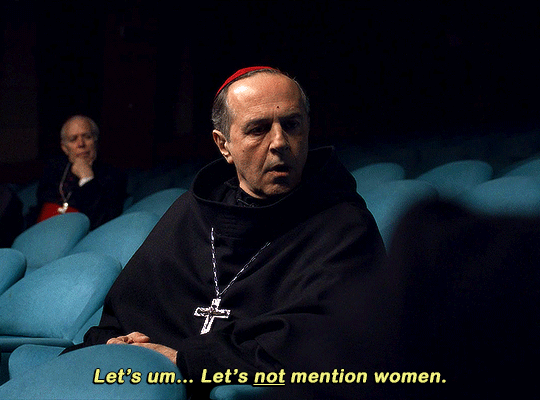
Conclave (2024) dir. Edward Berger
4K notes
·
View notes
Text
Why did “be critical of your media” turn into “find all its flaws and hate it” why did people become allergic to FUN
182K notes
·
View notes
Text



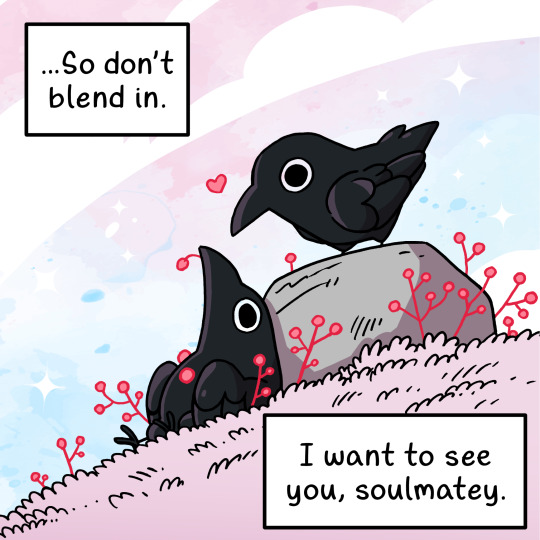

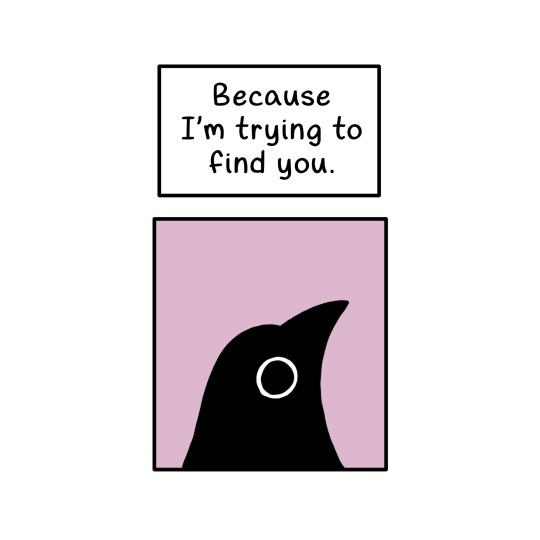

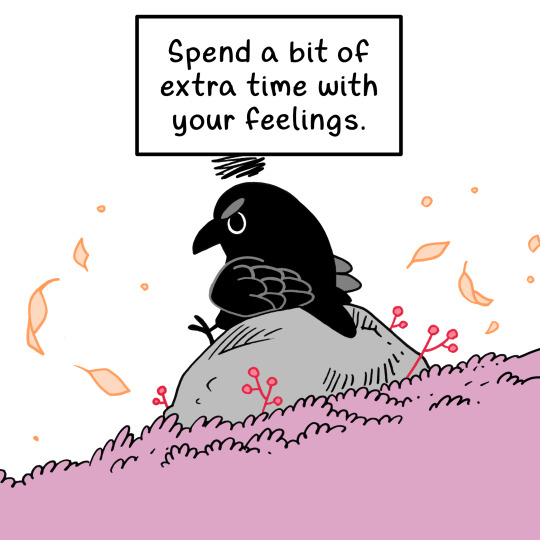
Please check out Crow Time on Webtoons.
⭐️LINK⭐️
23K notes
·
View notes
Text






Conclave (2024) dir. Edward Berger
4K notes
·
View notes
Text
AO3 has been scraped, once again.
As of the time of this post, AO3 has been scraped by yet another shady individual looking to make a quick buck off the backs of hardworking hobby writers. This Reddit post here has all the details and the most current information. In short, if your fic URL ends in a number between 1 and 63,200,000 (inclusive), AND is not archive locked, your fic has been scraped and added to this database.
I have been trying to hold off on archive locking my fics for as long as possible, and I've managed to get by unscathed up to now. Unfortunately, my luck has run out and I am archive locking all of my current and future stories. I'm sorry to my lovelies who read and comment without an account; I love you all. But I have to do what is best for me and my work. Thank you for your understanding.
31K notes
·
View notes
Text

the cruel prince: world’s most serious game of kiss, marry, kill
456 notes
·
View notes
Text
Coriolanus Snow: The Hanged Man
I still have yet to read Sunrise on the Reaping (hopefully this week). Instead, I'm going to fulfill my promise in this answer and write about Coriolanus Snow, because The Ballad of Songbirds and Snakes is, in my opinion, the most ambitious and successful narratively of The Hunger Games novels, and I constantly see people reducing the narrative from its tremendous nuance and complexity to a simple moral tale of "you can't fix him, silly girl" and/or "manic pixie dream girls aren't real."

Thinking Snow was a narcissist or born bad from birth misses the entire point of the novel. Thinking that he didn't really love Lucy Gray also misses the point. The point is that he did love Lucy Gray, and he still turned into a narcissistic villain because he has the freedom to make his own choices, and he makes all the wrong ones.
Sorry, Suzanne Collins likes love stories. She's going to keep writing love stories, because the love subplots play integral roles in the themes of both prequels and the main trilogy of The Hunger Games. They're part of the thematic point of each story, and while I do think you can make an argument that Gale's entanglement with Katniss is weaker than Katniss and Peeta, Lenore and Haymitch, and yes, even Lucy Gray and Coriolanus, you can't really argue that the romance is a "distraction" from the main themes and actually have a good understanding of the novels. Love is not extraneous to these books; it holds them together.
So, yes. The Ballad of Songbirds and Snakes is a love story. It just doesn't end happily ever after. See, Eren and Mikasa in Shingeki no Kyojin, or Catherine and Heathcliff in Wuthering Heights. Not all love stories end well! Not all tragedies are romantic tragedies like Titanic or Romeo and Juliet! Sometimes love doesn't have so clear a role in saving the day--but it could have, and that itself is the tragedy.
Sejanus: Wounded Sons Bearing Sins of the Father

Yes, Coriolanus is self-focused and self-centered. He is constantly thinking of how certain aspects can benefit himself, how he can restore his family's name and honor, how he can end up on top. He clearly feels the tear between a mother who died in childbirth and a father who had high expectations, but whom Coryo can barely remember.
However, I'd argue that as portrayed in the novel until the last quarter of the story, Coryo's self-centeredness is not a sign of narcissism so much as it is a realistic portrayal of a traumatized child.
You see, children are by nature egocentric, and Collins portrays this well in her books. They don't understand that the world is greater than what exists in their mind, and grow to understand it more. Coryo is stuck in one place (the Capitol), starved, loses both his parents, and understandably, doesn't really see outside of his own perspective until he meets Lucy Gray.
This marks his chance to open his mind. Coryo actually gets an Empathy 101 course from the story: he rides in the filthy car with the tributes, gets dumped unceremoniously into the zoo, and then gets sent into the arena. The story repeatedly challenges him to open up his mind, and he starts to do so, only to fold back in on himself at the end.
But what if I told you that Coryo is at least on equal standing in terms of self-centeredness and only thinking about how he feels with another significant character (who also is working through trauma and the burdens placed by a father). Yes, I'm talking about Sejanus Plinth.
But wait, Sejanus wanted to stop the Hunger Games!
Yes, he did. He went about it in the most immature way that ultimately just harmed everyone around him. Marcus, whom Sejanus didn't fully empathize with. His own parents and Coriolanus, who almost got killed when he's forced into the arena to save him. Coriolanus kills Bobbin doing so, and is traumatized by it. The girl locked up. Sejanus doesn't think his plans through.
He's not a bad person. His goals are noble, righteous even. But he, like every young activist ever, doesn't fully comprehend the effect his actions have on others, doesn't comprehend that good intentions don't justify the means, and that a righteous cause doesn't mean innocents can't get hurt through it. And while it sounds like I'm being harsh on Sejanus, these ideas are all thoroughly explored in the main trilogy, so I'm guessing Collins was very aware of this and Sejanus is intentionally a parallel to Coriolanus.
Actually, Sejanus isn't just a parallel. He symbolizes a part of Coryo, the heart to his wisdom. If they'd combined forces, they could have changed the world.
I'd also argue that people who think Coriolanus never cared about Sejanus are misreading to the same level as people who think Katniss never really cared about Peeta. They aren't reliable narrators. Coriolanus looks at him with a certain disdain, yes. But that's because he's uncomfortable looking at his child self, being vulnerable, traumatized, humiliated, and poor. Yet Coryo warns him over and over again when he doesn't have to.
But that's wanting control!
Well, yes. Where do you think pathological needs for control come from? Often, it originally starts as genuine concern from a traumatized person who has had very little control in their lives and has no idea how to express it as concern.
Sejanus is also, in Jungian terms, Coriolanus's inner child. Sejanus is constantly focused on his childhood and outspoken about it, while Coryo is actually the same way but not outspoken about it. He represents the trauma of war, the difficulty relating to parents (even though Sejanus has parents, and Coryo does not), the desperation to both grow up and find one's own identity, stand up for what you believe in, and to please the parents who gave you life.
So when Coryo eventually turns Sejanus in, he in essence dooms himself, though he naively doesn't think this will happen. He--rather childishly--assumes that Sejanus will just be in trouble but that his daddy can bail him out. After all, that's what's always happened before. His parents are powerful. He even writes to Sejanus's parents asking them to help.
Except, at some point your parents can't save you. I do read Coryo's trauma after Sejanus's hanging as genuine--he vomits and clearly feels guilt. He wanted a parent to rescue him, but none can.
Even as Sejanus dies, he cries "Ma, Ma, Ma!" for his mother. The tragedy is that by killing Sejanus, narratively, Coryo ensures that he will never allow this wounded child within himself to grow up. The loss of his parents will never heal.
Coryo ending up being essentially "adopted" by Sejanus's parents who completely miss his role in their son's death symbolizes him not growing up, because he cannot ever be really honest with them. He's not integrating with Sejanus and becoming more himself; he's lost his identity. He gets parents, but they're a lie, and he'll never experience the love and comfort of parents that he's craved.
He also then carries out his father's legacy of the Hunger Games, trying to please a ghost rather than real people around him. He chooses the dead, not the living.
Dr. Gaul and Casca Highbottom: Fear

Fear is the opposite of love.
This idea is Biblical and also pretty much embodied by the philosophy of Dr. Gaul, the woman Coriolanus hates, is absolutely terrified of, but becomes just like. It's no coincidence that Lucy Gray and Dr. Gaul are constantly pitted as opposites in Coriolanus's mind, because they represent his two potential paths in life.
Dean Highbottom traced the silver rose on the compact with a finger. “So, what did she say when you told her you were leaving?” “Dr. Gaul?” Snow asked. “Your little songbird,” the dean said. “When you left Twelve. Was she sad to see you go?”
Dr. Gaul is actually a manipulative abuser. She isolates Coriolanus from his friends by strategically alienating him from Clemensia. She sends him into the arena to save Sejanus, reinforcing to him that she has total control over his life. She, like Highbottom, knows the truth of his family situation and exploits it.
She thrives on chaos and cruelty, using the fear of her students, and Coriolanus's particular fear of her, to create a bond and further her own malicious aims.
The irony is that Coriolanus is capable of cruelty and manipulation. We know this not just from the original trilogy, but from his whole persona in the story. Dr. Volumnia Gaul is Coriolanus's Jungian shadow, the part of ourselves we try to repress and deny.
However, the only way to healthily handle the shadow is to accept it. Coriolanus instead murders it and thus it consumes him. In the end, Coriolanus becomes most like the person he fears most: Dr. Gaul. It's a tragically childish way of protecting oneself.
You see, I said murders because Dr. Gaul isn't his only shadow. The other shadows are present in Casca Highbottom and in Coriolanus's own father, whose shadow Coriolanus is constantly trying to live up to.

He doesn't understand Highbottom's hatred of him, which is a projection of his inability to understand his father's loss as a child. He tries and tries to embody whom he thinks his father would like him to become, and he tries and tries to win Highbottom over. When Highbottom comments about Arachne's funeral being over the top, Coryo assumes he's actually trying to bond with him, and admits he felt the same way--a lowering of the guard. Instead, Highbottom informs him that he's just like his father, using that one moment of vulnerability to tell Coriolanus he's a bad person.
“My condolences on the loss of your friend,” the dean said. “And on your student. It’s a difficult day for all of us. But the procession was very moving,” Coriolanus replied. “Did you think so? I found it excessive and in poor taste,” said Dean Highbottom. Taken by surprise, Coriolanus let out a short laugh before he recovered and tried to look shocked. The dean dropped his gaze to Coriolanus’s blue rosebud. “It’s amazing, how little things change. After all the killing. After all the agonized promises to remember the cost. After all of that, I can’t distinguish the bud from the blossom.” He gave the rose a tap with his forefinger...
The irony is that Highbottom ends up creating a tragedy of his own. In assuming Coriolanus is just like his father, he helps shape Coriolanus into becoming exactly just like his father. He reinforces to Coriolanus that he can't trust others. When Coriolanus murders Highbottom via his addiction (something he can't be free from), he allows his shadow to consume him.
Our assumptions about people shape who they become. This is at the core of the novel's themes, but it's also countered by Lucy Gray and her internal freedom.
Lucy Gray: Performance and Freedom
If Sejanus is Coryo's inner child and Highbottom/Dr. Gaul are his shadows, then Lucy Gray is his anima, in Jungian terms. Anima literally means "soul," and Lucy Gray does symbolize his soul (symbolism isn't literal--she was her own person, and that's part of Coriolanus's downfall: that he can't accept that).

Lucy Gray starts off the series as a child singing as she's dragged away to die, and in her Coryo sees himself. Him greeting her with a rose is a symbol of him acting like his own mother (as the roses are associated with her--the powder tin, etc), and him entering the truck and then being unceremoniously dumped into the zoo is not only a chance to empathize with Lucy Gray (which he actually does), but to see his own circumstances from a new perspective.
Being a "Snow" isn't a gift even if it seems like it is. It's a prison, and more than that, it's a zoo. People gawk at him because of his name, but in reality he's starving and desperate to survive even after the war. Him being locked in there and then seeing what Lucy Gray endures at the zoo is him being given the chance to look at his own circumstances as a child locked away in the Capitol and starving.

Coriolanus sitting and eating with Lucy Gray as an equal is a sign of maturity, and so is his determination to sneak her food and keep her alive. Yes, it's a bit egocentric in a childish sense, but he's literally a teenager.
While Coriolanus will later lose himself to the fear that Lucy Gray is just performing in her relationship with him because it would save her life (and I've read some interpretations agreeing with this, which I don't think the book supports at all), the irony is that Coriolanus Snow is performing too. Every action he takes he thinks about how it will appear--and that's not just with Lucy Gray and his role as a mentor in the Hunger Games. He's stuck performing too.
Both Lucy Gray and Coriolanus are both performers, and more than that, they have to play the role the Capitol gives them. The Capitol says Lucy Gray is District 12 and has to die for that, but Lucy Gray is actually Covey and never participated in the war. Coriolanus is a Snow and that commands respect and expectations, yet his family is actually still starving and on the verge of eviction. Neither neatly fit in the roles the Capitol declares they are based on heritage and setting, but they have to endure the expectations and burdens of those roles nonetheless.
However, Lucy Gray finds freedom in performing her songs and culture. Performing doesn't equate to fake, and once you strip the layers of someone, you can trust them even in their performances.
Coriolanus also faces a way to use his background and performance to help, and he does use it to save Lucy Gray in the arena. He also has multiple options of which Snow he wants to become: his mother. Tigris. Grandmama. Or, his father, the one he actually thinks about the least until the end.
It's Lucy Gray's free spirit, the way she turns her prisons and performances into art, that draws Coriolanus in. Yes, when he kisses her at first he does think of her in a jealous, possessive way. Given his background and given that he's a teenager, that's not abnormal. He's been trapped in one city his whole life.
So when Coriolanus is sent to District 12, he symbolically has the chance for freedom, too. He could choose to open his mind in the districts, to freedom. He has a chance.
Sadly, he hangs, lies to, and then shoots his chance.

The Hanging Tree
So, anima has four stages.
Eve (mother)
Helen (romantic interest)
Mary (religious devotion)
Sophia (wisdom, guide to the inner life)
In the beginning of Coriolanus's relationship with Lucy Gray, he associates her with his mother (the rose, the compact). He even gives her his mother's scarf (yes, there's some Oedipal imagery). Highbottom even calls it out:
“Your pretty, vapid mother, who’d somehow convinced herself that your father would give her freedom and love. Out of the frying pan and into the fire, as they say.” “She wasn’t” was all Coriolanus managed. Vapid, he meant. “Only her youth excused her, and, really, she seemed fated to be a child forever. Just the opposite of your girl, Lucy Gray. Sixteen going on thirty-five."
Then he goes on to see her as someone he's pursuing romantically... and then he loses himself when given the chance to explore the religious devotion (so never approaches a wisdom phase).
See, as Coriolanus and Lucy meet up to flee, this happens:
“It’d be nice, in my new life, not to have to kill anyone else.” “I’m with you there. Three seems enough for one lifetime. And certainly enough for one summer." ... “Can you get this out?” He held out his hand, wiggling the compromised fingernail, hoping to distract her. “Let me see.” She examined his splinter. “So, Bobbin, Mayfair . . . who’s the third?” His mind raced for a plausible explanation. Could he have been involved in a freak accident? A training death? He was cleaning a weapon, and it went off by mistake? He decided it was best to make a joke of it. “Myself. I killed the old me so I could come with you.” She plucked the splinter free. “There. Well, I hope old you doesn’t haunt new you. We’ve already got enough ghosts between us.” The moment passed, but it had killed the conversation.”
Lucy Gray offers him the chance to confess. To trust her with the worst parts of himself. To truly be free.
And he lies, and in the end she removes the splinter like a mother removing one from a child, not as a person forgiving and setting another free.
The moment Coriolanus killed his future as a healthy, healing adult, was when he didn't take responsibility for Sejanus, when he says he killed himself. The irony is that this sentence itself kills Coriolanus''s development. It kills Lucy Gray's ability to trust him.
Coriolanus then embodies the lyrics of "The Hanging Tree."
They strung up a man They say who murdered three
He murdered three, and has strung himself up.
Are you, are you Coming to the tree? Where I told you to run So we'd both be free
He's fleeing with Lucy Gray, aiming to be free together.
Are you, are you Coming to the tree? Wear a necklace of rope/hope Side by side with me
In the books, it's "rope;" the films turned it to "hope," and Collins would have known about this by the time of writing this book. Hence, the scarf Coriolanus gave Lucy Gray that she leaves for him to find, and that this is the section of the song the mockingjays sing when he's hunting for Lucy Gray in the ending.
They are both hanged men, and him more so than her. Yes, Lucy Gray is never able to leave the arena, still afraid that everyone is trying to kill her, but she still has a sense of self. And Coriolanus, being part of the Capitol, is partly to blame for this.

Worse, Coryo lost his sense of self. He sees a snake and assumes she's trying to kill him, but it wasn't venomous, and the reader pointedly never knows whether it was deliberate or not.
Because Coriolanus cannot control Lucy Gray. She has herself, and she's chosen to be free. He can shoot up her sanctuary and make the rest of the world pay for his own mistakes, but he can never control her.
In the end, Coriolanus becomes both his parents. His better nature, his chance to grow and have freedom and love, his chance to live a new life, dies at the very moment he could have given birth to it. And he becomes a cruel, calculating war criminal.
And in the end, The Hunger Games as a series reinforces its main theme: hurting children forced to hurt children because the adults around them had petty conflicts.
246 notes
·
View notes
Text






CONCLAVE (2024) + LETTERBOXD REVIEWS

14K notes
·
View notes
